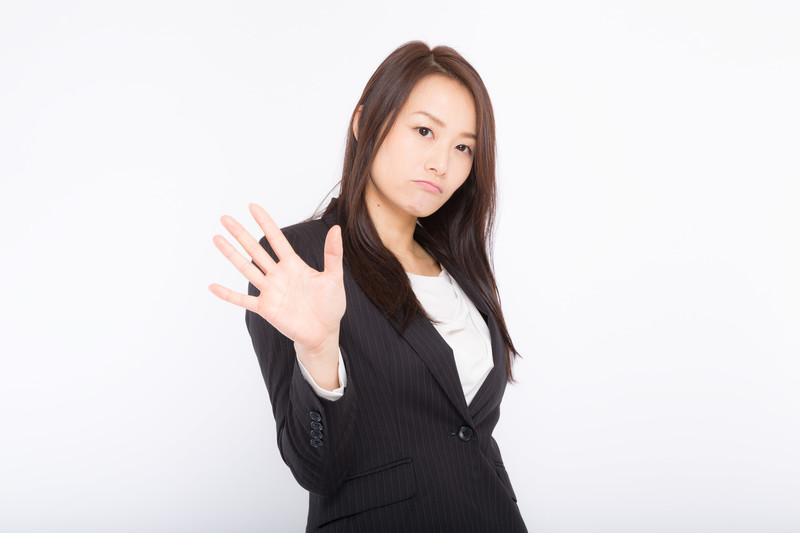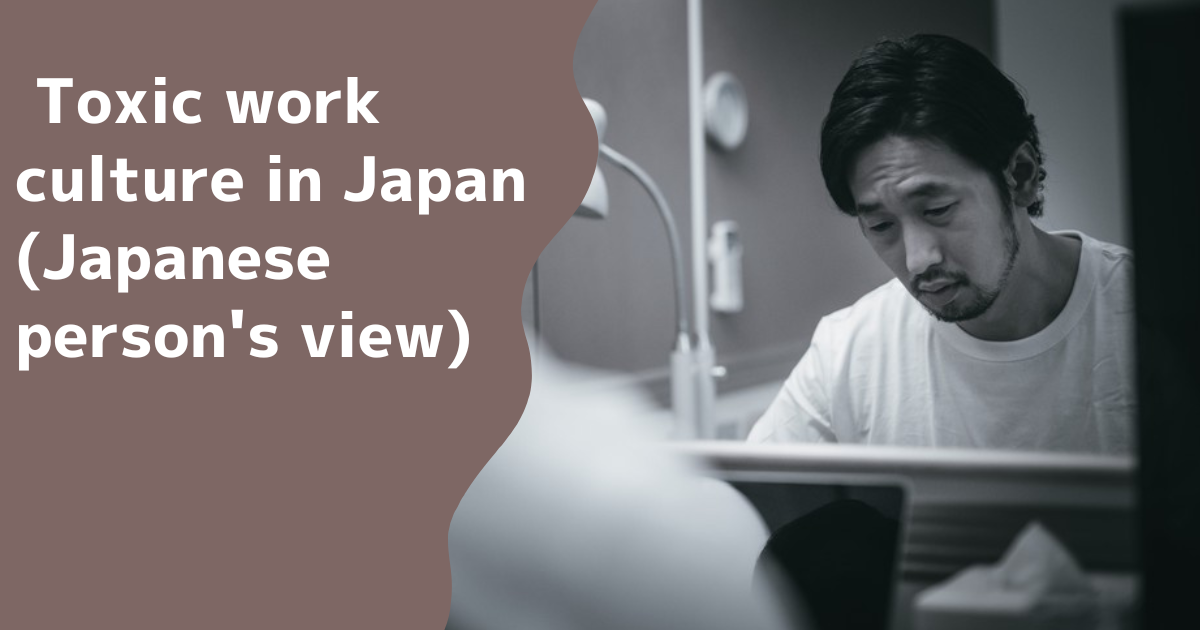When you have a possibility to work in Japan you might be wondering what Japanese work culture is.
If it is so, you could also be worried about the possibility of overtime work or any negative side of the Japanese company’s environment.
In fact, “Karoushi (overwork death)” became a huge social issue in Japan recently, and Japanese people work hard comparing other counties’ people and we are required to have loyalty to their belonging companies.
As a result, Japanese companies have such as below negative tendencies.
-Overtime work
-The wage is less than the legal minimum wage
-Less holiday and annual leave usage
-Harassment by supervisor/senior
In this article, I’d like to introduce the toxic work culture in Japan and how to avoid entering such a bad work environment company there.

Let me introduce about myself.
I am Hiro from Tokyo, Japan, born and raised here.
I have working experience in Japanese companies (logistics and manufacturing) as an international sales for almost 10 years, so I well understand Japanese people’s work culture.
After reading it, I hope you will understand what toxic Japanese companies’ tendencies are, avoid such an environment and enjoy your work life in Japan.
Toxic work culture in Japan

Japanese companies require loyalty from employees which means the workers must be obedient to the company system and accept a hard-working environment if the company requires it.
The system was overall successful till the 1990s because Japanese economic growth was high at that time and a hard-working environment provided workers with a good salary few people picked up the issue of toxic work culture in Japan,
but now the situation in Japan has changed dramatically and their income has not been increased well and still some companies require such loyalty to employees, this work condition became issue rather recently.
I’d like to explain each tendency of a traditional toxic work environment.
Overtime work
We Japanese people often do overtime work.
According to Doda, a Japanese famous recruitment company website (It is Japanese website), the average overtime work in Japan is 22 hours per month in 2022.

22 hours per month means approximately 1-hour overwork per day.
(If Saturday, Sunday, and public holiday is deducted, around 20 days is the working day in Japan in one month and 22 hours can be divided into 20 days to be approximately 1.1 hours per day)
Japanese companies’ typical working hours are from 8:30 (or 9:00) to 17:30 (or 18:00), so 1 hour of overtime work means that the majority of Japanese people finish work at around 18:30 or 19:00 (1 hour of overtime work).
The overtime work length is totally depending on the type of job and many overtime work jobs are as follows.
-Producer/Director/Planner for publishing, advertising, Web, or film (37.1 hours)
-Business consultant (37.1 hours)
-Construction management (35.3 hours)
Overtime work is considered positively
There are still some Japanese companies that consider overtime work to be a positive thing and employees who overwork a lot of hours receive a good evaluation.
Instead leaving the office soon after regular working hours such as 17:30 or 18:00 is considered negative.
There is the regulation of overtime work (e.g. there is the restriction of more than 40 hours of overtime work per month) introduced by Japanese governments recently, but still, there is the culture of evaluating workers by working hours.
For instance, in my company in Japan, there was a senior who always leave the office soon after the regular working hours of 17:30 and his supervisor often felt uncomfortable about him since the supervisor still needed to ask about several matters with my senior after 17:30. The senior was evaluated negatively due to his early leave.
Peer pressure
Workers cannot finish work easily if other workers (supervisor, senior, colleague) in the same department are working overtime in Japan.
Some companies require workers to ask the same department’s busy workers whether there is anything to help before leaving the office.
If they answer there is no necessity for support then the workers can leave the office.
It is a really annoying culture but when I was working in the first company there was such kind of culture and as a result, all the workers couldn’t leave the office till 8 pm.
Less than the legal minimum wage

Some companies require employees to work hard though the salary is not fully paid.
Those companies set salaries less than the legal minimum wage or no overtime work fee even though there is a lot of overtime work or holiday work.
When I was working in the first company in Japan, all the workers worked around 8 pm and no one ever clocked out at leaving time and strangely it became the usual situation for all the workers. (The boss never allow clocking out late) As a result, our income including overtime work fee was much less than the legal minimum working hours.
Recently those illegal companies are punished by labor standards act, so I hope those companies are gradually decreasing.
Low annual leave usage
Japanese people tend to take fewer annual leaves.
Based on the poll done by travel agent Expedia (Referring to the below Japanese website), annual leave usage in Japan was around 50% till 2020 and more than half of the annual leaves left was not fully used.
In Japanese working places, taking annual leave is considered to be a negative thing and we have kind of guilty about taking annual leave even one day in our mind and some workers even bring souvenirs to give to their coworkers to show gratitude for letting them take annual leave.
If you won’t take given annual leaves (Usually 10-20 days received per year) in a certain period the annual leaves are expired, so a lot of them are wasted.
We all forget taking annual leave was a kind of employee’s right.
In 2019, the Japanese government started a regulation that all Japanese companies must let employees have at least 5 times annual leave per year, otherwise, the companies get punished.

I feel like my company’s workers gradually think positively about taking annual leave after this regulation is started.
Power harassment from your boss
There is a possibility that your supervisor/senior harass you badly. Power harassment in Japanese companies means that bosses take advantage of their status and give too many tasks or bully subordinates and give mental distress to them.
The problem in this case in Japan is employees are quite weak in the hierarchical company system and many of them couldn’t complain easily being scared of their retaliation or they cannot easily resign because a lifetime working in one company is thought to be a virtue in Japan and many Japanese people regard quitting a job is negative things.
When I was working in a logistics company, one of my seniors tended to harass and scold me in front of many other workers and forced me to drink a lot of alcohol when having dinner with him. I was lucky because he left the company 1 year later, but working with him for 1 year was really painful and I couldn’t claim about it or resign and just be patient at that time because I was scared to be jobless in Japan.
Recently Japanese government started regulating harassment in the workplace and there are a lot of assistant counters to harassment and I hope the situation is improving due to that.
How to avoid entering toxic work culture’s company

I explained toxic work culture tendencies in Japan and you might think how terrible Japanese companies’ work environment is and you could reconsider not coming to Japan to work.
However, there are also many good work conditions companies in Japan.
For example, in my current working Japanese company, I personally consider the working environment is relatively good such as monthly overtime work is less than 10 hours (less than 30 min overtime work per day) and paid vacation usage ratio is relatively high compared to other companies and employees health is well considered.
If so, how should you find such a good work environment company?
Check job postings & internet information carefully
To choose good work conditions companies, please carefully check job postings and internet information, which provide you with the information of overtime work situation of each company before applying for a job interview.
Average overtime work information is described in the most job posting, so don’t miss it.
If average overtime work or overtime work fee is not clearly mentioned you’d better ask companies during an interview.
It is not kind to hide the information and you possibly should avoid such companies if it is not shared openly.
Also, internet information is important to check reputations and whether company workers are satisfied with the current company’s condition or not.
Other parts to be checked in a job posting

There are other parts to check for job postings to decide whether you should apply to a company or not and I’d like to tell you some of them.
The job posting is posted for a long period or not
You need to carefully check whether a job posting that you are interested in is posted for a long period or not.
If it is a long period appearing such as half a year or more, that company is not popular among Japanese or employees are quitting frequently due to bad working conditions and then there is the necessity of posting for a long period.
so you possibly should avoid applying for such a long period of posted jobs.
The hiring condition is too loose or not
If the condition of hiring is loose (not strict at all) such as no academic background required, no age limitation, or no experience required, that company’s working conditions could be bad.
Some companies which exploit employees need more and more workers because it is high resignation rates,
so not many conditions are required for hiring nevertheless to get new using up employees soon.
If you find such job postings, you should avoid applying.
Income level is too high or not
Usually if income level is high it can be considered positively but it could possibly include overtime work fee or holiday work as well and consequently, you might be required much overwork daily
so please carefully check whether the income level described in the job posting is average or too high.
Some companies don’t specifically describe income breakdowns, so you should be careful if the income in a job posting is too high.
Conclusion
In this article, I explained about toxic culture in Japan.
I hope you understand what kind of bad work environment tendencies Japanese companies have and how to avoid applying to such a company and also hope you will enjoy your work life in Japan if you have a chance to work there.
Thank you for reading my article till the end.



コメント Comment